
11 minute read
FOOD AND INSPIRATION with Samuel Kapepo
WITH SAMUEL KAPEPO
FOOD AND INSPIRATION
Samuel Kapepo was born in 1985 in the township at Oshakati. His mother left when he was very young, and he was raised by other families. Not seeing the point of school, he dropped out, and made trouble stealing other children’s food and getting up to mischief.
Samuel’s life took a dramatic turn when he moved to Windhoek in 2004. That’s when he started the Kids’ Soup Kitchen, where, with the help of the community, he feeds less privileged people.
Every Sunday, around a hundred and twenty people visit his soup kitchen. There they receive not only food, but also books from his container ‘library’ in Katutura – and along with that, inspiration.
“In my storeroom, I have a bunch of books. Sometimes I feed their minds.
“I’m proud of the way I am, you know, because some of the guys that I grew up with, some of them are behind bars, some of them went to rest forever.”
In 2010 Samuel was nominated for the Jet Store Community award, which he won and was presented with in Johannesburg.
“I couldn’t believe it, you know, I went from zero to hero. Going to Joburg and getting on the stage to pick up that award was something. I remember when I started this project, people couldn’t understand what I was doing. They thought I was doing things just to impress human beings, you know? But going to South Africa with one of my family, taking that flight, and having that magnificent hotel to sleep in, encouraged me so much. It inspired me.”
The success of the project is driven by the many helping hands that go every Sunday to peel potatoes and onions, and play with the children. Samuel uses this opportunity to engage with children and inspire their parents to start initiatives to earn money – to fix what is broken.
“I tell them to go to school, and why you have to go to school. “It’s a team effort,” explains Basson, who notes that You want to drive this car, you want to live in luxury? Go to their team includes the sponsors. “We need to transport school. Don’t smoke. You know, we were not told why when everyone and everything to remote locations. We take we grew up. We thought washing our hands was punishment along all the medical equipment and medication that will from parents, but it was hygienic.” be needed. Nampower and Standard Bank have really been great supporters of this project over the years. Samuel’s inspiration to continue comes from the work itself. Without them, there would be no way of seeing to as many people as we do.”
“Number one is the smile on their faces. Number two, they call me ‘father’. Number three, they call me ‘brother’. Number four, Explaining why Hochland 154 Round Table chose to assist they call me ‘Uncle Kapepo’.” with healthcare in remote areas of Namibia, Basson says, “Namibia is a vast and sparsely populated country, with most of the medical facilities concentrated around larger towns and cities. For many individuals, not living around the main centres means they do not have access to For additional income, Samuel regularly takes visitors on tours healthcare. Medic RUSH tries to reach these people and around his community in Katutura, showing them a unique deliver a service not normally accessible to them. Namibian experience. “For me, Round Table is an organisation where young, energetic people can get together to give their time
TO CONTACT SAMUEL, CALL HIM ON
and expertise to help those around us and the Namibian
TEL +264 81 234 6589 OR EMAIL HIM
community. We create a platform where people can
ONSKAPEPO@GMAIL.COM
become friends, network and combine their skills. People have the opportunity to learn from much more experienced mentors, and are able to gain valuable skills.”
Get involved or support this and other Hochland 154 Round Table initiatives through their Facebook page, @Hochland.154. RT, or the Round Table Namibia website,
WWW.ROUNDTABLENAMIBIA.COM.
Positive Change for Our Communities
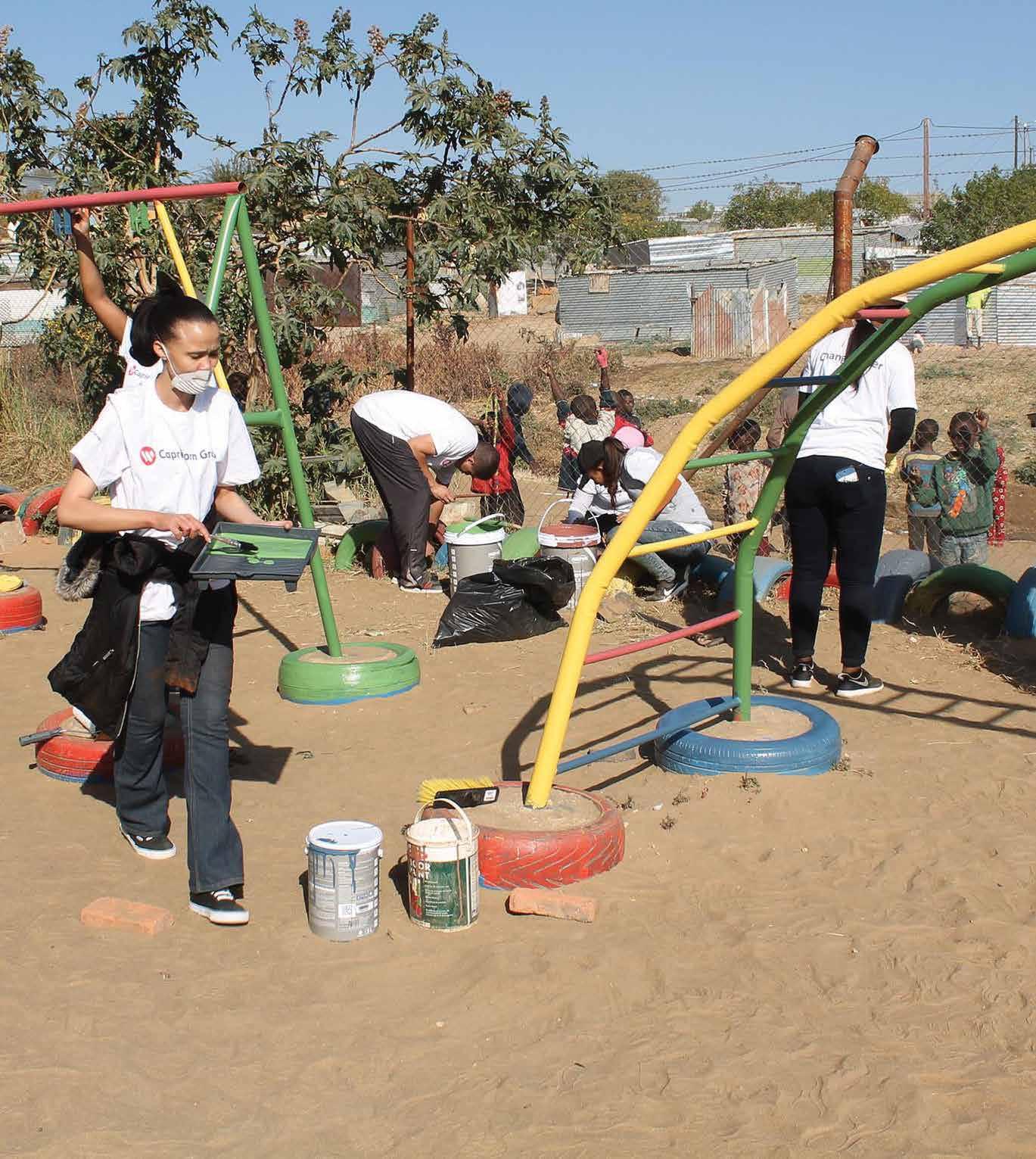
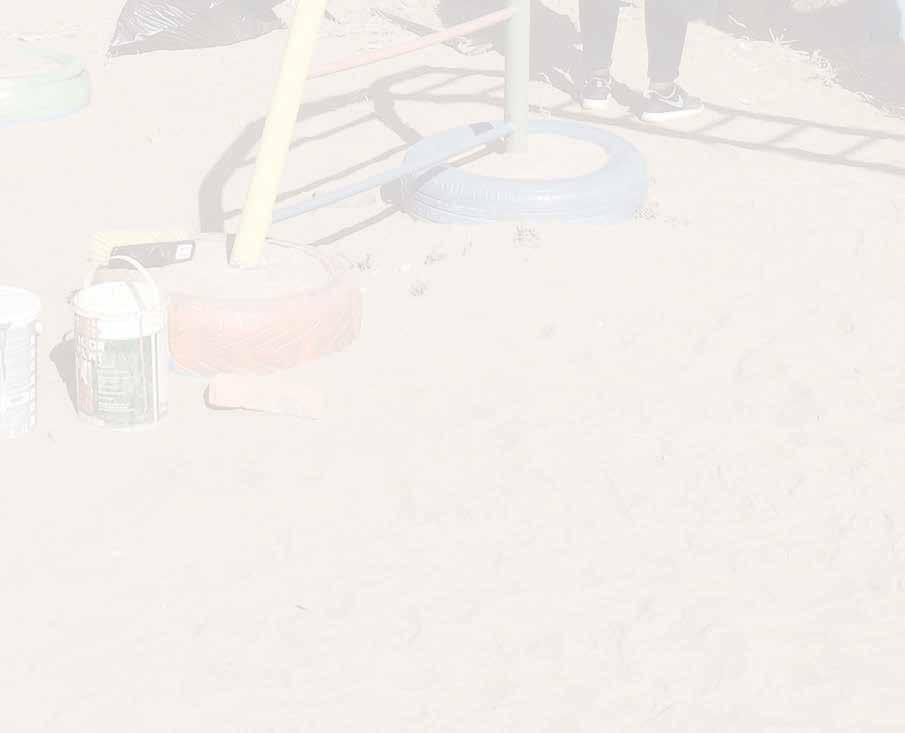
As a responsible corporate citizen, Capricorn Group and its subsidiaries, like Bank Windhoek, aspires to be Connectors of Positive Change by creating economic value in a responsible way, that creates sustainable opportunities for advancing and improving the economic and social conditions in the communities in which we operate. This sense of responsibility helps us to be socially accountable to ourselves and our stakeholders and to minimise any adverse effects on society so that we make an overall positive impact. For us, Corporate Social Responsibility means doing the right thing, for the right reasons.
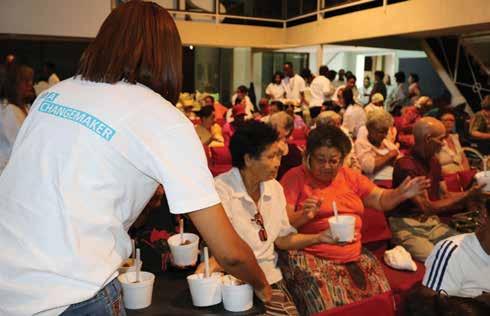
As a group of companies, we would like to make a profound and lasting impact on society, based on a deep understanding and appreciation of societal needs, in line with our brand purpose of being Connectors of Positive Change. Every Capricorn citizen has embraced this purpose and is encouraged to dedicate their time and own resources as Changemakers to bring positive change to our communities through impactful deeds. Throughout the year, our Group of Changemakers, as we refer to our employees who volunteer their time and resources, support the CSI initiatives of the Group and reach out to the most vulnerable of communities by actively engaging with the beneficiaries of these projects. The Capricorn Group Changemakers creates a lasting impact through their willingness to serve and will continuously look for opportunities to make a difference in our communities.
Capricorn Group believes that getting the basics right is vital in building our society and that social responsibility goes beyond just investing financially in social projects. We also commit to spending our time, skills and other resources to support these projects to become successful and sustainable.
Bank Windhoek, the flagship brand of Capricorn Group through its Social Investment Fund (SIF) strives to make an impact in the communities in which it operates. To achieve this, the Bank focuses on the following investment areas: • Economic advancement with a focus on entrepreneurial skills development • Education and training • Health with a focus on diseases such as cancer, as well as mental health and disability programmes • Projects that address and support the basic needs of vulnerable children, specifically those who experience hunger, poverty and gender-based violence • Sustainability programmes in support of the SDG’s with a focus on No Poverty and Hunger, Good Health,
Gender Equality, and Climate Action.
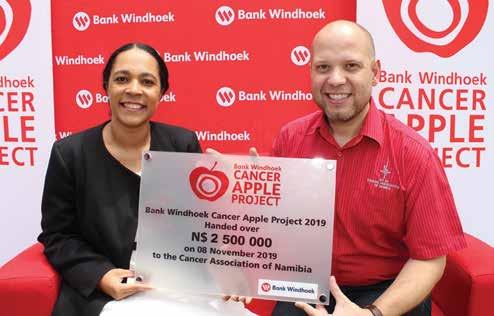
Some Supported Recipients: • Launched in 2000, The Bank Windhoek Cancer Apple
Project is one of Namibia’s largest and most successful fundraising projects. The funds collected through the sale of apples nationally, enables the Cancer
Association of Namibia (CAN), to reach out and screen
Namibians in all 14 regions for prostate, cervical and breast cancer, at no cost. • Omba Arts Trust is a non-profit organisation committed to poverty alleviation and job creation. The
Trust assists marginalised communities by providing them with a platform to generate revenue from their traditional handicrafts. • Women at Work is a not-for-gain organisation, and dedicated to developing semi-skilled, unemployed
Namibian women and men by providing high quality basic skills training. • Action Child Mobilisation is a non-profit organisation committed to Early Childhood Development. The organisation provides training to teachers, equipping them with the necessary equipment to educate children between the ages of 3 and 5 years, in impoverished communities across Namibia.
In addition to providing financial support, projects must have a long term vision and have a desire to become self-sustaining. Each project is accountable for the spend of allocated funding and reports to SIF on their progress every quarter.
Bank Windhoek hosts a bank-wide Empathy Project annually, where branches and departments across the country are provided with funding to support any community project in their respective towns or region. This creates great excitement among staff members, as they are able to give back to their communities and make a difference.
As we look into the future, we are excited about the imminence of the Capricorn Foundation, as the vehicle through which the Group will run its corporate social responsibility programmes, funded and supported by Bank Windhoek.
A WINDOW OF OPPORTUNITY. A VISION WITHIN VIEW
Imagine what would happen if every child in Namibia had access to education, at no cost, in every corner of this country. Imagine it. And then help to make it happen ...
Frikkie Louw, founder of Edugate Academy in Otjiwarongo, has one mission in life: to make quality education available to as many children as possible through the Eduvision Project.
Three years ago, he deliberately sought out the school in Namibia with the worst pass rate. It was Tsumkwe Secondary School situated in Bushmanland, in the Otjozondjupa region in the east of the country – and it had a pass rate of zero.
It was remote, cut off from the world, and unable to attract and keep teachers.
Frikkie got into his car and drove to the school to see what he could do.
The resulting collaboration between Edugate Academy, Paratus Telecom and B2Gold is a beautiful story of remote learning. Lessons from Edugate are beamed via a dedicated satellite link onto “smart boards” in a classroom hundreds of kilometers away, which allows for interactive teaching of the children. Through the smart application of technology, one teacher is now able to reach a number of classrooms simultaneously, thereby multiplying the available intellectual capital.
Within two years, Tsumkwe Secondary School had moved up about a hundred places in Grade 12 results, with one of their learners now studying at UNAM, something that was previously unfathomable.
Wonderful as this solution is, the exercise is extremely costly and technology dependent, which made it difficult to roll out to all schools across the country. As it happened, One Africa Television had already been developing #LearnOnOne, an education-support platform to provide extra classes, learning support and education to all Namibians via all the One Africa platforms, free of charge. One Africa television reaches and connects with a vast audience right in their living rooms or on their mobile devices.
Compelled by the implications of the Covid-19 lockdown on school learners across the country, One Africa TV accelerated the process and found in Eduvision an eager, excited and “ready yesterday” partner.
Within a matter of weeks, One Africa launched #LearnOnOne, a non-profit sub-brand of One Africa TV, with the purpose of sustainably providing Namibian children and adult-education learners with free extra classes and access to educational material.
On 14 April 2020, #LearnOnOne started broadcasting recorded lessons of the current Namibian school curriculum for Grade 12, 11 and 10, provided by Eduvision.
Morning schedules already included early-childhood development educational programmes and the vision for #LearnOnOne is to eventually provide extra classes and educational content for all school grades, early childhood and adult education. This will empower caregivers, parents, teachers, children and learners of all ages, from all walks of life.
One Africa TV is a free-to-view channel providing content free of charge to broadcast platforms. It is supported by clients who advertise on the channel and who sponsor content – so the more support #LearnOnOne gets, the more content can be sourced, produced and supplied to enable a new culture of learning in our country.
One Africa TV will broadcast #LearnOnOne material during daytime-TV hours on its channel on DStv 284 and GOtv 90, as well as on streaming platforms Tv2Africa.com (subscriptionfree) and DStv Now. Stefan Hugo, CEO of One Africa TV, commented on why One Africa TV is investing in #LearnOnOne: “With the rebranding of One Africa TV in 2018, we committed ourselves to using our platforms and audience-access to make life better for every Namibian we cross paths with. The #LearnOnOne platform and the partnership with Eduvision aligns perfectly with this goal. We believe that access to quality education for all Namibian children will change the trajectory of Namibia’s future for the better.” The Edugate Academy states that: “It has always been our dream and aim that every learner in Namibia would benefit from the type of supplementary teaching that the Eduvision project has managed to bring to schools, especially in remote areas. The agreement with One Africa TV brings us another step closer to this dream. Yes, recorded lessons can never replace a teacher, but using it as supplementary material has demonstrated great benefits for learners.” Taleni Shimhopileni, Content Manager at One Africa TV and #LearnOnOne project leader adds: “The alignment of purpose between Eduvision and One Africa TV for this project makes us extremely excited. We are grateful and thankful to Eduvision for agreeing to partner with us.”
How to support this project Organisations interested in joining to support free TV learning for Namibian children are encouraged to contact One Africa TV or Eduvision.
STEFAN HUGO, CEO, ONE AFRICA TV STEFAN.HUGO@ONEAFRICA.TV +264 81 141 0504
TALENI SHIMHOPILENI, CONTENT MANAGER, ONE AFRICA TV
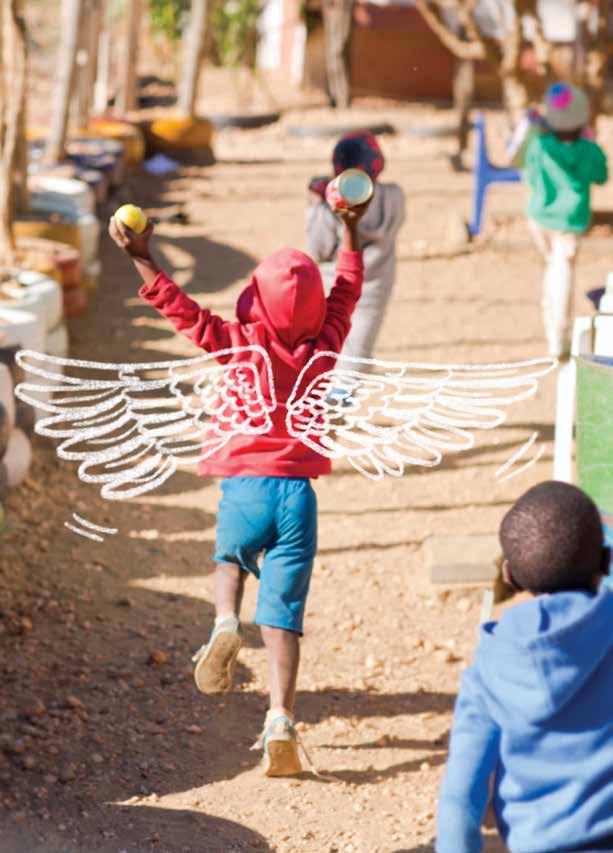
TALENI@ONEAFRICA.TV +264 81 792 8897
FRIKKIE LOUW +264 81 246 7259
EDUVISION PROJECT
Free extra classes and edutainment on One Africa TV
Invite learning in… Into your home, on your couch, on your phone, within reach. For everyone.
#LearnOnOne brings quality extra classes and educational programs to supplement school education during daytime on One Africa TV. All children should attend school, but an extra lesson at the right time can unlock a new world for many Namibian children.
#LearnOnOne broadcasts weekdays on One Africa TV’s platforms:










